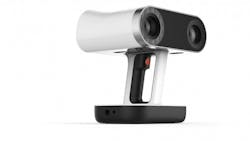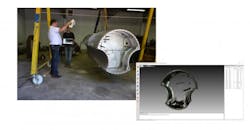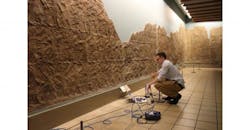Are you as impatient as me for this future everyone always talks about? You know, the one where every device and machine is connected to better serve humanity, where robots do all the monotonous and dangerous jobs while you live out your fantasies in virtual reality, and anything and everything you need—from replacement parts for your robot slave to a new liver—can be 3D printed and delivered to you by drone?
These are all real goals from real technology experts, and if technology continues to grow exponentially—as Moore’s Law states—we’re closer to this Philip K. Dick fantasy world than the era without iPhones, announced exactly one decade ago.
One of the major keys to unlocking this high-tech utopia/dystopia made its first appearance this month at the 50th CES in Las Vegas: the Artec Leo 3D scanner.
The reason a handheld 3D scanner could cause such an upheaval is that our world is three-dimensional, and it is becoming increasingly digital. These devices use lasers and cameras to model real world objects and convert them into digital files. They are the portal between the messy physical world we are stuck in and the pristine virtual world where we have total control.
With Leo’s 60 frames per second rate, the Luxembourg-based Artec 3D can currently claim that the Leo is one of the fastest 3D scanners ever made.
The faster you can scan, the more you can scan. The more you can scan, the faster everything has a digital copy. From there, who really knows?
From a manufacturing standpoint, metrology, reverse-engineering, rapid prototyping, quality assurance, and design applications all use 3D scanning now. Non-industrial uses include medical and forensic applications.
“Given Leo’s high fps rate, you get more reliable tracking,” says Andrei Vakulenko, Artec’s chief business development officer, and point of contact at the CES Booth in the Sands Expo & Convention Center. “You don’t need to think if your movements are smooth enough to capture the surface. You scan faster.”
Speed makes this scanner an intriguing tool, but hardly a catalyst for the impending technological singularity. What makes this industrial scanner truly innovative, and comparable to the iPhone in terms of disruption, is that this wireless 4-lb device can be used anywhere, and makes any user feel like an expert.
“While 3D scanning still requires some skill, we make our scanners as easy to use as cameras,” Vakulenko says.
A built-in battery and wireless connectivity aren’t the only thing that makes this mobile. Artec installed a NVIDIA Tegra mobile platform, which includes embedded FPGA, quad-core CPU, and 1-teraflop GPU processors, along with a 5.5-in. touchscreen, making Leo the first scanner to allow automatic 3D processing onboard.
In simple terms, you see exactly what your 3D model looks like as it’s being scanned. You need only to look at the screen on the back, like a 3D version of a digital camera.
“With Leo, you don’t need any tablets or laptops to scan,” Vakulenko says. “You can freely walk around the object you’re scanning, and thanks to the scanner’s built-in half HD screen you can see scan data collected in real time right in front of your eyes.”
Even Artec’s popular Eva—a beloved tool for 3D modelers and printers in fields varying from archaeology to Hollywood special effects— looks absolutely primitive to the new king of the 3D jungle. Whether it’s a metrological task in a casting foundry or capturing fossils at an African dig site, the Eva requires a rather cumbersome configuration of power supply, laptop, and scanner, all tethered together by a tangle of wires.
For small objects, this really isn’t that much of a problem. But if you’re walking around a car, for instance, that configuration is not just annoying; it’s sometimes a safety issue.
“In some industries it’s dangerous to be scanning and having to do too many things, like in aerospace,” says Vakulenko.
New Equipment Digest is an IndustryWeek companion site within Penton's Manufacturing & Supply Chain Group.




